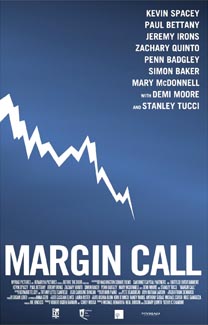
Starts September 29
Original language: English
 Characteristically Americans are known to rise above adversity, admit failure and learn from their mistakes. No doubt that the U.S. financial crisis of 2008 will be the backdrop for many future narrative features and documentaries. On the wings of a Sundance 2010 selection The Company Men from director John Wells, comes another story to take on the U.S. Wall Street affairs. The first-time filmmaker and writer-director, J.C. Chandor, makes his debut at the Sundance film festival 2011 in Margin Call. Similar in theme, the two films vary in style but both plug into the intense entanglement of the human emotions when lives are threatened by a corporate financial predicament.
Characteristically Americans are known to rise above adversity, admit failure and learn from their mistakes. No doubt that the U.S. financial crisis of 2008 will be the backdrop for many future narrative features and documentaries. On the wings of a Sundance 2010 selection The Company Men from director John Wells, comes another story to take on the U.S. Wall Street affairs. The first-time filmmaker and writer-director, J.C. Chandor, makes his debut at the Sundance film festival 2011 in Margin Call. Similar in theme, the two films vary in style but both plug into the intense entanglement of the human emotions when lives are threatened by a corporate financial predicament.
In real life, J.C.’s father, Jeffrey Chandor worked for Merrill Lynch, the prominent Wall Street securities firm, for some forty years. Growing up in the Chandor household, J.C. gleaned from the impact of difficult decisions his father was forced to tend to as a representative of a frantic world of finance-- knowledge unbeknown to the average citizen. Jeffrey was a perfect insider for J.C. to rely on for advice to the films authenticity. At his fingertips were other financial veterans who gave credence to the genuine representation of the scenarios and personalities specific to the J.C.’s narrative. Jeffrey is proud of his son’s comprehension of a very complex world of business operations and its people. He notes, “To put all of these elements into a story so that an average guy-on-the-street can understand and potentially learn about the business is J.C.’s talent. That is what he is good at.” J.C. understood the ramifications of his dad’s stress level, especially with a swinging door of firing or hiring staff members. At a very young age, J.C. witnessed friends’ lives fall apart or succeed at the whim of a phone call. His knowledge and observations have now transpired into his long-awaited dream to tell a compelling story, on the big screen, wrapped in appropriate candor.
The onset of the 2008 U.S. financial crisis opens an investigation administered by the government on the activities of a Wall Street U.S. investment bank. This particular day begins with firing over eighty percent of the banks’ employees, including one of the company’s respected senior analysts, Eric Dale (Stanley Tucci). Shocked by the manner and bad form of his impulsive dismissal he quickly puts in a call to his boss, Sam Rogers (Kevin Spacey) for clarification. His cell phone is blocked and he immediately understands that the action is not a joke. In minutes, agents hurriedly take over Dale’s office and confiscate his belongings. Dale tries to remain calm knowing a forced escort out of the building will soon take place. Dale works quickly to lean into his co-workers. He hands over secret information logged onto his work dock-station to junior analysts, Peter Sullivan (Zachery Quinto) and Seth Bregman (Penn Badgley). He confides that while working on configurations of the bank’s assets, he’s uncovered a large amount of phoney investments similar to what brought down Lehman Brothers. Only a few hours of work left were necessary to confirm the data. Dale adamantly told his colleagues they had to finish the work because the information could potentially paralyze the company including extensive losses adding up to a trillion dollars. A handful of individuals left working in the U.S. investment bank’s analyst department are caught holding-the-bag of insider trading information. Each one is summoned to “stay after work” to get a handle on the dilemma. An intense 24-hour period embodies by the film’s focus and proves to be more of a Catch-22 quandary. In reality, it just takes one person to make the margin call that will affect the livelihood of many, as well as, expose disturbing truths about the process of decision-making inside the financial corporate world. But, don’t underestimate the power of a very human story set in a thriller narrative methodology.
